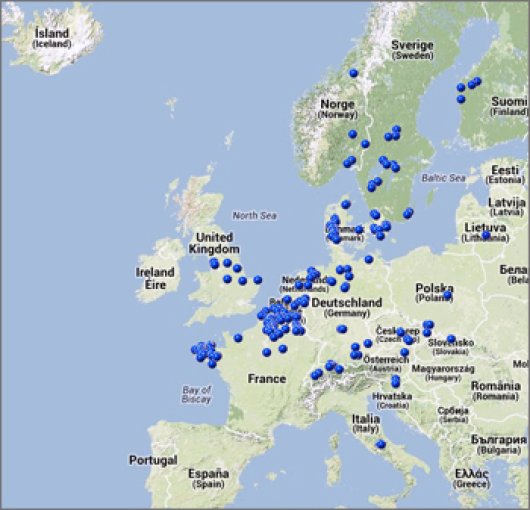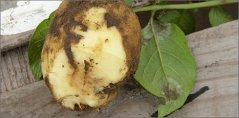Wageningen, The Netherlands
December 11, 2013
By Plant Research International, Applied Plant Research

Fast new techniques for genetic identification enable a more specific control of the potato disease phytophthora; this is the theory of scientists from Wageningen UR, who aim to partner with industry to further analyse the genetic variation of the pathogen and link it to practical recommendations. This will allow potato growers to optimally align their choice in fungicides and resistant varieties with the strains of the pathogen that occur in their region. “It is a unique approach that offers opportunities for other crops as well,” say phytophthora experts Huub Schepers and Geert Kessel.

Locations in Europe where samples from phytophthora are taken within the EuroBlight project. Click on the picture to go to the interactive map on the EuroBlight website.
Genetic fingerprint
Information on the genetic composition of phytophthora populations has been collected for some time. Considerable knowledge exists as to which genetic varieties of phytophthora infestans are active in the Netherlands and how these populations have developed over the years. The first analysis on a European level took place in 2013 within the EuroBlight network. In the 2013 growing season, field employees at the participating companies (crop protection companies, potato breeding companies, research institutes) collected genetic fingerprints by rubbing affected plant parts on a special cardboard card. Laboratories in the Netherlands and Scotland are currently using these samples to determine the DNA profiles and the results will be published via the EuroBlight website.
Monitoring prevents damage

Wageningen UR is now looking to join forces with a group of Dutch companies to take the next step within the framework of a public-private partnership. In addition to taking more samples, they aim to collate knowledge on the characteristics of the various strains. Recent research by Schepers and his colleagues showed that certain fungicides suddenly became ineffective as a result of the development of new aggressive phytophthora strains. These connections were found by coincidence after damage had occurred in numerous plots. By testing isolates for their sensitivity to active substances, future damage can be prevented and the efficiency of crop protection products improved.
Precompetitive research
Seven companies from the chemical sector have joined the initiative to date. They understand the importance of precompetitive research and can use the new knowledge to improve their recommendations to growers. Also potato breeding companies are interested to participate. It is important that breeders are familiar with shifts in pathogen populations to enable them to use resistant varieties more effectively.
If the government accepts the project proposal, the parties will start in the next growing season.
Integrated Pest Management (IPM)

Pathogen monitoring was recently explicitly included in the new guidelines for IPM (Integrated Pest Management), the European vision on an integrated approach of pathogens and pests. It is no coincidence that the measure will first be developed on a large scale for phytophthora. With 1,400 tonnes of active substance a year, the Dutch potato sector is a leader in fungicide consumption and the disease costs Dutch growers over 100 million euros in crop protection and losses every year.